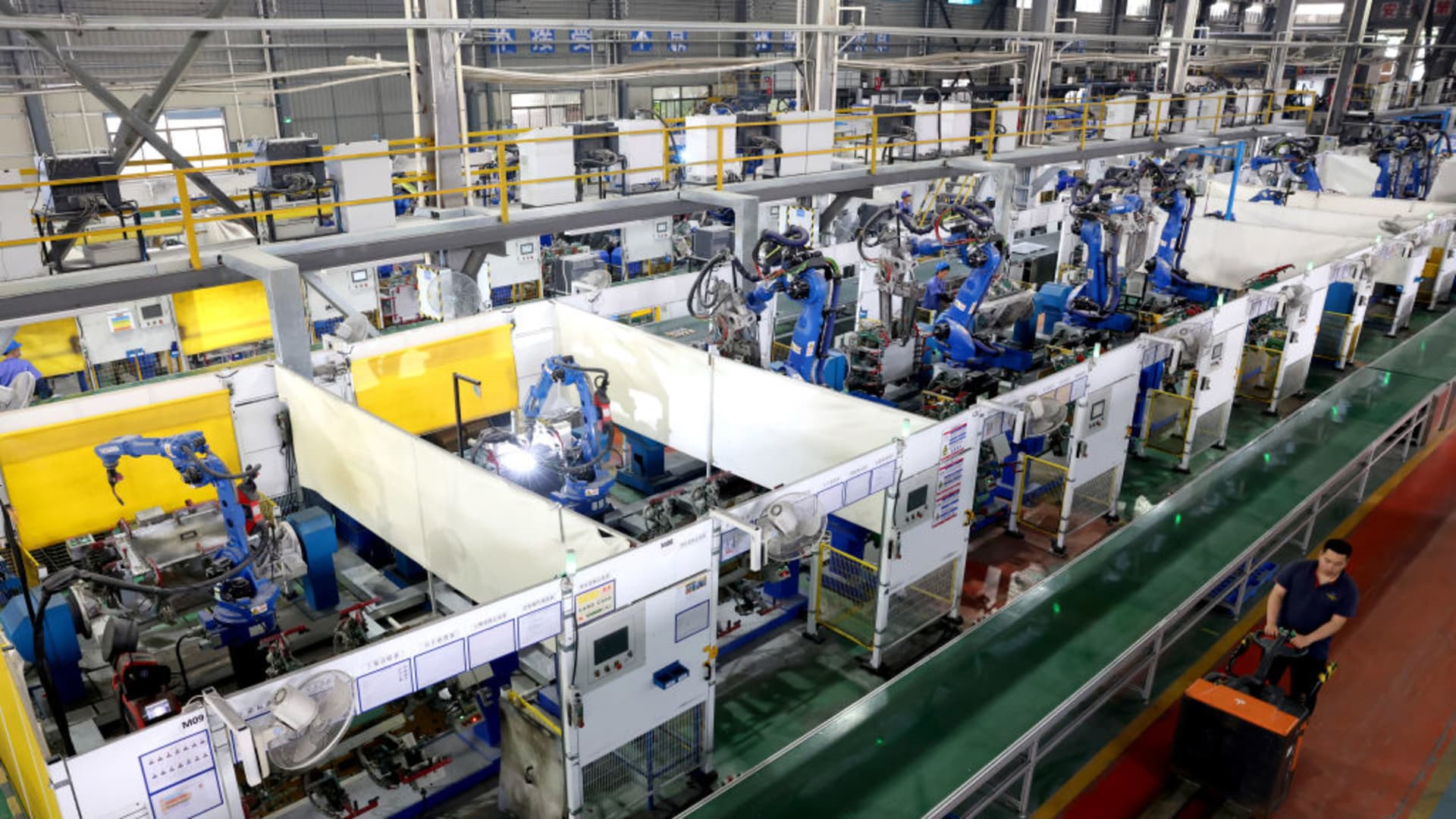Finance
European companies in China are under pressure from slower growth and overcapacity

A robot produces car parts on the production line of an auto parts company in Minhou County, Fuzhou, China, on May 7, 2024.
Nurfoto | Nurfoto | Getty Images
BEIJING – European companies in China are finding it harder to make money in the country as growth slows and pressure on overcapacity increases, according to a survey published Friday by the EU Chamber of Commerce in China.
In the metropolis of Shanghai, businesspeople even reported delays in receiving payments as it became more difficult to enforce contracts compared to the previous year, according to chapter head Carlo D’Andrea.
“State-owned enterprises have postponed payments and are using this to obtain de facto loans from companies, especially small and medium-sized enterprises,” D’Andrea said, referring to members’ comments.
Chinese growth has slowed in recent years due to geopolitical tensions. A slump in the real estate sector, which has close ties to local government finances, has also dragged down the economy.
Only 30% of respondents to the EU Chamber survey said their profit margins in China were higher than their company’s global average – an eight-year low.

In 2016, only 24% of respondents said their profit margins in China were better than globally, the report said.
That reflected a crash in the Chinese stock market in the summer of 2015, in addition to a slowdown in the property market at the time, EU Chamber President Jens Eskelund told reporters.
He said the current slowdown in Chinese growth has similar cyclical aspects, but there are questions about how long and deep it will be this time.
The Chamber’s latest survey included 529 respondents and was conducted from mid-January to early February.
This year’s questionnaire included a new question asking whether members encountered difficulties transferring dividends back to their head office. While more than 70% reported no problems, 4% said they were unable to do so, and about a quarter said they experienced some problems or delays.
It was not immediately clear whether this was due to a new regulatory stance or typical tax audit requirements.
What’s happening now is that companies are starting to realize that some of these pressures may become more permanent.
Jens Eskelund
EU Chamber of Commerce in China, Chairman
China’s economy is now much larger than in 2015 and 2016. Trade tensions with the US have also escalated in recent years, with Beijing doubling production to strengthen technological self-sufficiency.
“Our members saw, to some extent, that their ability to grow and make profits in the Chinese market – [the] The correlation with the GDP figure is becoming weaker,” Eskelund said.
“What matters for foreign companies is not necessarily a gross GDP figure of 5.3% or whatever, but the composition of GDP,” he said. ‘If you have a GDP that is growing because there is more investment in production capacity, that is not good for foreign companies. But if you have GDP that’s growing because domestic demand is growing, then that’s a good thing. “
China’s National Bureau of Statistics will announce fixed asset investment, industrial production and retail sales for April next Friday.
Overcapacity surplus
China’s emphasis on manufacturing, coupled with modest domestic demand, has led to growing global concerns that overproduction will shrink profit margins.
More than a third of respondents to the EU chamber survey said they have observed overcapacity in their sector in the past year, and a further 10% expect this to happen in the near future.
The civil engineering, construction and automotive industries had the highest percentage of respondents reporting overcapacity.
More than 70% of respondents indicate that overcapacity in their sector has led to price drops.
“These are not just European companies whining,” Eskelund said. “This is just as painful, if not more painful, for Chinese companies.”
Market opening in some sectors
Chinese authorities have meanwhile stepped up high-level efforts to attract foreign investment.
Eskelund noted that Beijing’s recent visa-free policy for several EU countries has given executives the flexibility to plan trips to China a week in advance, instead of two to three months earlier.
He added that Beijing’s expansion of tax exemption policies has also encouraged more international staff and their families to stay in China.
Cosmetics and food and beverage companies have benefited from China’s recent efforts to open its market, he said, noting that a record high of 39% of respondents said the local market in their sector was fully open.
China has limited the extent to which foreign companies can own or operate in certain industries. Beijing removes a number of banned categories every year through a ‘negative list’.
Record high skepticism
However, the EU Chamber and other business organizations have said China can do much more to implement its 24 measures to improve the environment for foreign companies.
The House’s latest survey found that a historically high number of respondents said conditions were worsening:
- a record high indicated they were skeptical about their growth potential in China over the next two years
- A record number of respondents expect competitive pressure to increase
- a record share doubts their profitability in China
- a record-high plan to reduce costs this year, mainly by reducing headcount and limiting marketing budgets
- a record number of respondents said they had missed opportunities in China due to regulatory barriers, the magnitude of which was equivalent to more than half of their annual revenue
- a record low on expectations that regulatory hurdles will ease
“If you compare it to previous years, we can see that many of the concerns actually remain the same regarding the predictability and visibility of the regulatory environment,” Eskelund said. “These concerns remain much the same.”
“What’s happening now is that companies are starting to realize some of these pressures that we’ve seen in the local market, whether it’s competition, whether it’s lower demand, or whether they might be more permanent in nature. get,” he said. “That is something that is starting to influence investment decisions and the way people think about developing the local market.”









